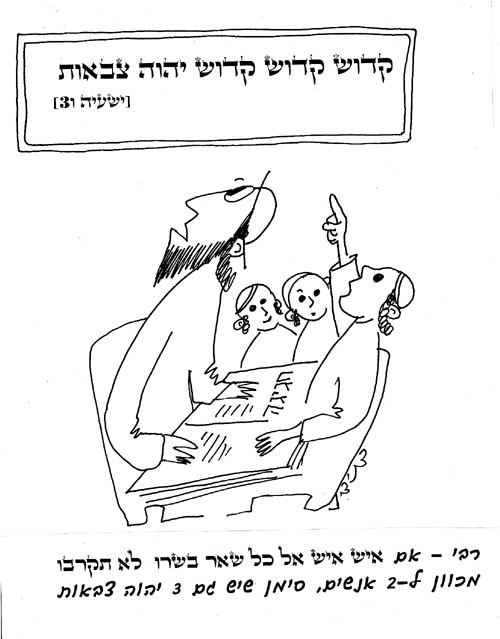
The early sages (Tanaaim) ruled that a teacher is forbidden to teach the laws of personal relations, adultery, and forbidden relations to a group of three students, only to a pair of students or a single student. The scholars (Amoraim) try to clarify the reason for this ruling. It is written “No man or man shall approach anyone who is near of kin to him, to uncover his nakedness” (Leviticus 18:6). The verse can be interpreted as “man or man” — two students, “anyone” another student, making three, and of this number of students it is said “do not approach to uncover his nakedness;” do not discuss or study the Torah laws of personal relations and adultery in a group of three students. The scholars asked: If the words “man or man” imply two people, then the verse “For every man and man who curses his father or his mother shall surely be put to death” (Leviticus 20:9) should be interpreted to mean that only one who curses his parents along with another people will be punished, but that interpretation is unlikely and not generally accepted. The scholars tried to explain the source of the early sages’ prohibition from a different verse: “Therefore you all shall keep My ordinance, so that you do not commit any of these abominable customs” (Leviticus 18:30). “You all,” in the plural implies two people and the words “My ordinance” adds another person, totaling the three people who are forbidden to deal with issue written about later in the verse, “abominable customs.” This implies that one is forbidden to study personal relations and adultery with fewer than three people. The scholars asked: If from the words “You all shall keep” we learn to imply two people, then the verse “And you all shall keep the Sabbath” (Exodus 31:14) we should learn that to keep the Sabbath requires two people and that a single person need not keep the Sabbath, but this interpretation is not reasonable nor accepted.
One of the scholars, Rav Ashi, explained that the early sages’ prohibition against the study of personal laws and adultery in a group of three does not apply to those laws explicitly listed in the Torah, only to personal laws implied by the verses. The explanation for the prohibition is caution, to prevent a mistaken understanding of the issues. If the teacher works with three students at the same time it is possible that one student will ask the teacher a question about personal relations or adultery and the other two will discuss something between themselves, not listening to the teacher, and because they did not listen to the teacher they may come to forbid what is permitted and permit the forbidden. But one may teach two students, for if one asks the teacher a question the other student will listen attentively to the answer. The scholars asked: If there is presumed danger of two students not listening to their teacher, we should unilaterally forbid the teaching of three students on any Torah topic, lest they not listen to their teacher. Answer: The fear on the issue of adultery is greater, for the sexual urge is strong and can cause the student to permit the forbidden: “The soul desires theft and sex and craves them.” The scholars asked: If so, we should also forbid a group of three students from learning the laws of theft, which a person’s soul desires. Answer: The sexual urge is always present, even if a person is all alone, while a desire to steal exists only when the opportunity for theft is before him.
(Babylonian Talmud, Tractate Chagigah 11b)
